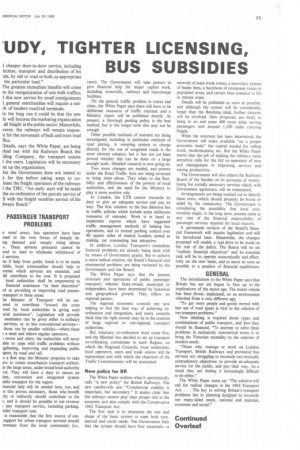BUS SUBSIDIES
Page 27

If you've noticed an error in this article please click here to report it so we can fix it.
rates). The Government will take powers to give financial help for major capital work, including monorails, railways and interchange facilities.
On the general traffic problem in towns and cities, the White Paper says there will have to be deliberate measures of traffic restraint and a Ministry report will be published shortly. At present, a thorough parking policy is the best method, but in the longer term this may not be enough.
Other possible methods of restraint are being investigated, including in particular methods of road pricing. A metering system to charge directly for the use of congested roads is the most obvious solution, but it has not yet been proved whether this can be done on a large enough scale. Detailed research is now going on.
Two more changes are needed, and powers under the Road Traffic Acts are being reviewed to bring them about. They relate to the flexibility and effectiveness of the powers of local authorities, and the need for the Ministry to play a more positive role.
In London, the LTB cannot reconcile its duty to give an adequate service and pay its way. The first solution to the bus dilemma lies in traffic policies which include some deliberate measures of restraint. Work is in hand to implement reports which have suggested traffic management methods of helping bus operations, and to extend parking control over 40 square miles of central London, aimed at making car commuting less attractive.
In addition, London Transport's immediate financial problems are already being dealt with by means of Government grants. But to achieve a more radical solution, the Board's financial and commercial problems are being reviewed by the Government and the Board.
The White Paper says that the present structure and operations of public passenger transport, whether State-owned, municipal or independent, have been determined by historical and geographical growth. They follow no regional pattern.
The regional economic councils are now helping to find the best way of achieving coordination and integration, and many councils think that the right answer may lie in the creation of large regional or sub-regional transport authorities.
. But voluntary co-ordination must come first, and the Minister has decided to set up transport co-ordinating committees in each Region, on which the Regional Councils, local authorities. local operators, users and trade unions will be represented and with which the chairmen of the Traffic Commissioners will be associated.
New policy for BR The White Paper outlines what it optimistically calls "a new policy" for British Railways. The new catchwords are: "Commercial viability is important, but secondary." It makes clear that the railways cannot play their proper role in the economy and also comply with the Conservative 1962 Transport Act.
The first task is to determine the size and shape of the basic system to meet both commercial and social needs. The Government feels that the system should have four essentials—a network of main trunk routes, a secondary system of feeder lines, a backbone of commuter routes in populated areas, and certain lines essential to life in remote areas.
Details will be published as soon as possible. and although the system will be considerably larger than the Beeching ideal, further closures will be involved. New proposals are likely to bring to an end some 400 route miles serving passengers and around 1,300 miles carrying freight.
When the structure has been determined, the Government will make available -on a proper economic basis" the capital needed for rolling stock, modernization, etc. But the White Paper warns that the job of making the railways more attractive calls for the full co-operation of men and management in improving services and raising productivity.
The Government will also relieve the Railways Board of the burden on its accounts of moneylosing but socially necessary services which, with Government agreement, will be maintained.
Arrangements are being worked out to identify these costs. which should properly be borne or aided by the community. The Government is considering the possibility that local communities might, in the long term, assume some at any rate of the financial responsibility of passenger services retained for local reasons.
A permanent revision of the Board's financial framework will require legislation and will be introduced later. Meanwhile, the changes proposed will enable a real drive to be made on the rest of the deficit. The Board will be set "realistic financial objectives" and its essential task will be to operate economically and effectively on the new basis, and to move as soon as possible to a position of financial equilibrium.
GENERAL The introduction to the White Paper says that Britain has not yet begun to face up to the implications of the motor age. The motor vehicle has been thrust, unplanned, on an environment inherited from a very different age.
"To get more people and goods moved with less use of road space is vital to the solution of our transport problems."
New thinking is required about types and combinations of public transport, and how they should be financed. "To attempt to solve these problems in exclusively commerical terms is to bring the Victorian mentality to the solution of modern needs.
"Those who manage or work on London Transport, British Railways and provincial bus services are struggling to reconcile two mutually contradictory objectives: to provide an adequate service for the public, and pay their way. As a result they are finding it increasingly difficult to do either," The White Paper sums up: "The solution will call for radical changes in the 1962 Transport Act. . . . The key to solving Britain's transport problems lies in planning designed to reconcile our many-sided needs, national and regional, economic and social."
































































































































































